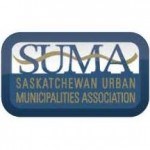The provincial deficit was the talk of this year’s Saskatchewan Urban Municipalities Association (SUMA) convention.
Gordon Barnhart of Saltcoats, the newest SUMA president, said having the support he did for president of SUMA was certainly rewarding.
“I received 399 votes, 399 leaders of the province voted for me,” he said. “It’s great to have that kind of support from leaders across the province.”
But Barnhart is also aware that he has taken the helm of SUMA at what he noted some suggest are “troubled times.” He said he is certainly aware the provincial government is facing challenges in the face of an estimated $1.2 billion deficit, and those challenges may filter down to municipalities.
Barnhart said Premier Brad Wall was pretty straightforward that the deficit is huge, and that is not what he wants in Saskatchewan.
“He (Wall), and the people of Saskatchewan don’t like to see deficits,” suggested Barnhart.
Yorkton Mayor Bob Maloney said that was certainly the key taken home from this year’s SUMA convention.
“It was a very sombre premier with tough love,” stated Yorkton’s Mayor.
Maloney said the $1.2, or maybe $1.5 billion deficit is certainly an issue for the province, but some of the underpinnings of the economy remain good.
“Business in the province remains fairly strong,” he said, adding there is still an inflow of people to the province, and job numbers are also good.
However, resource revenues have not hit projections for the province, which have occurred before, and Maloney said it may be time to look at basing expectations on something other than volatile resource revenues.
“How do we go forward,” he asked.
Maloney said if we want the best in education and health care, as examples, “how are we going to pay for it?”
Of course there is the concern that balancing the provincial budget in the face of such a large deficit could grind the economy to a halt.
“It’s a huge number to look at,” reiterated Maloney. “I don’t think it can be balanced in a year.”
However, Maloney said the province does need to determine “what they can fix and what is sustainable.” He said they need to identify the core responsibilities as a province and focus on those.
There are going to be changes in the upcoming provincial budget, and that may mean less money to municipalities, although Barnhart himself is not quite as dire in whether that will occur.
“On the other hand I’m cautiously optimistic,” he said.
One of his immediate jobs as SUMA president will be to lobby the province to keep money flowing to municipalities something he said makes good sense for the province to do.
“We (municipalities) provide essential services,” said Barnhart, adding he believes they are good stewards of provincial dollars.
As it is municipalities will see five per cent less in terms of the municipal portion of provincial sales tax, based on lower PST generated two years ago.
Barnhart noted no one in SUMA is complaining about that decrease because the program formula was designed so municipalities “get more in good times and less in harder times.”
But if greater cuts come municipalities will face some difficult decisions since by legislation they cannot deficit finance.
“If we have less resources we would have to cut services, or raises taxes,” he said.
Maloney said that is something he is aware of considering at the most recent regular meeting of Yorkton Council they had a presentation on work to mitigate storm water issues which had a $40 million price tag.
Municipalities have limited tools in terms of raising funds, so unless that is changed, revenue sharing from the province is very important.



